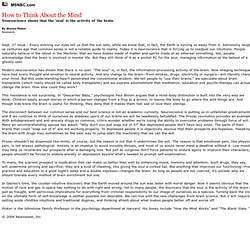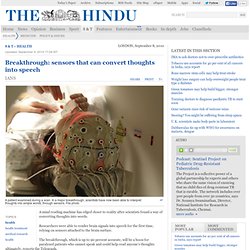

1of6) - Battle of the Brains. Brain Basics. VS Ramachandran: The neurons that shaped civilization. The Brain-Information about the Brain. 1 Introduction “I think, therefore I am.”

—René Descartes, 17th-century philosopher Few of us question the crucial importance of the brain. It is vital to our existence. Our brains enable us to think, as René Descartes so skillfully pointed out nearly 400 years ago. The brain makes up only 2 percent of our body weight, but it consumes 20 percent of the oxygen we breathe and 20 percent of the energy we consume.
Scientists have worked for many years to unravel the complex workings of the brain. Despite these and other significant advances in the field of brain research, most of the processes responsible for the integrated functioning of billions of brain cells remain a mystery. An essential aspect of any scientific research is communicating results to the public in a way that is easily understood. To correctly interpret the information transmitted through these venues, we need a better understanding of basic concepts related to the brain. MSNBC - How to Think About the Mind. How to Think About the MindNeuroscience shows that the 'soul' is the activity of the brain Sept. 27 issue - Every evening our eyes tell us that the sun sets, while we know that, in fact, the Earth is turning us away from it.

Astronomy taught us centuries ago that common sense is not a reliable guide to reality. Today it is neuroscience that is forcing us to readjust our intuitions. People naturally believe in the Ghost in the Machine: that we have bodies made of matter and spirits made of an ethereal something. Yes, people acknowledge that the brain is involved in mental life. Modern neuroscience has shown that there is no user. This resistance is not surprising. The disconnect between our common sense and our best science is not an academic curiosity.
Prozac shouldn't be dispensed like mints, of course, but the reason is not that it undermines the will. To many, the scariest prospect is medication that can make us better than well by enhancing mood, memory and attention. UCSB scientists discover how the brain encodes memories at a cellular level ... (Santa Barbara, Calif.) –– Scientists at UC Santa Barbara have made a major discovery in how the brain encodes memories. The finding, published in the December 24 issue of the journal Neuron, could eventually lead to the development of new drugs to aid memory. The team of scientists is the first to uncover a central process in encoding memories that occurs at the level of the synapse, where neurons connect with each other. "When we learn new things, when we store memories, there are a number of things that have to happen," said senior author Kenneth S.
Kosik, co-director and Harriman Chair in Neuroscience Research, at UCSB's Neuroscience Research Institute. Kosik is a leading researcher in the area of Alzheimer's disease. "One of the most important processes is that the synapses –– which cement those memories into place –– have to be strengthened," said Kosik. This is a neuron. (Photo Credit: Sourav Banerjee) Part of strengthening a synapse involves making new proteins. Mouse Party. Burundanga. Mind Reading. A mind reading machine has edged closer to reality after scientists found a way of converting thoughts into words.

Researchers were able to render brain signals into speech for the first time, relying on sensors attached to the brain surface. The breakthrough, which is up to 90 percent accurate, will be a boon for paralysed patients who cannot speak and could help read anyone’s thoughts ultimately, reports the Telegraph. “We were beside ourselves with excitement when it started working,” said Prof Bradley Greger, bioengineer at the Utah University who led the project. “It was just one of the moments when everything came together. “We have been able to decode spoken words using only signals from the brain with a device that has promise for long-term use in paralysed patients who cannot speak. The breakthrough came when the team attached two button-sized grids of 16 tiny electrodes to an epileptic’s brain’s speech centres, says the journal of Neural Engineering.
How Does the Brain Retain Information?